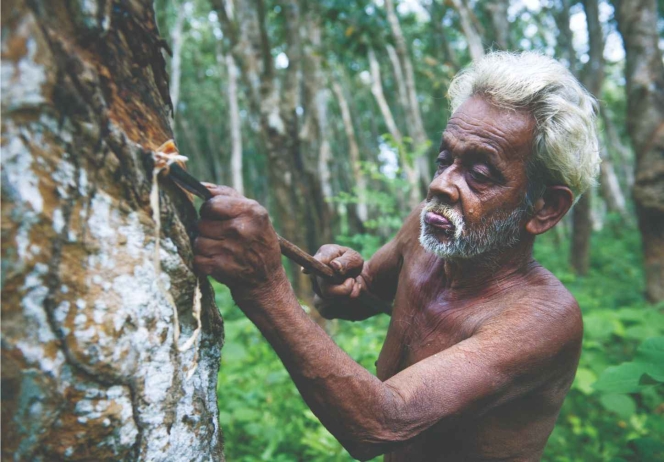
 Sustainability is a vague idea. How do you define sustainability in the natural rubber sector?
Sustainability is a vague idea. How do you define sustainability in the natural rubber sector?
I think sustainability is vague if you have not looked at it with a good set of eyes. If you see it as a concept, then it certainly is not vague. Many standards have been introduced in the last 30 years and organisations and stakeholders have worked around this concept. The sustainability concept is evolving and is very well defined in the areas we operate in nowadays.
GPSNR defines sustainability through a multi-stakeholder process where we bring in members of GPSNR together. Our organisation represents all parts of the supply chain, from smallholders to processors and traders to manufacturers and civil society. Today, we represent about 60 percent of the global natural rubber volume.
Our supply chain sustainability commitments include the environmental, social and economic aspects of sustainability. The definition of sustainability for our members is now very well defined through a document, which is approved and called the policy framework document. This is a set of eight overarching themes that include commitments to legal compliance, community livelihoods, healthy and functioning ecosystems (including no deforestation) and respecting all human rights. Our GPSNR members need to have policies aligned for the production and procurement of sustainable natural rubber.
The great news is that after the document was approved last year, the GPSNR members are now aligning and publishing policies to be in line with this framework. Of course, these are commitments that do not explicitly mean implementation. Now the next step for us would be reporting requirements for our members. The members will have to publish reports every year, and we are defining the requirements for these reports now. For them, it will be to demonstrate how they are reaching this commitment. We are also working on implementation guidance that will help companies implement an assurance model. It aims to understand the different risks and identify the modes of assurance based on the level of risk. It ensures that the commitments are met and that any claim the company makes on sustainability is verified.
Would there be any mechanism to know how companies are implementing the policies?
For GPSNR, it is not about reinventing the wheel. We don't want to create another certification standard. We have certification systems out there. I think, especially in the rubber sector, we need something that goes a bit broader than the current specification for certification because we have 85 percent production coming from independent smallholders, owning 1-2 hectares of land each, which makes it quite challenging to scale up certification promptly. So we are building up an assurance model, which is going to be a risk basis. The basic idea behind this is that instead of having a standard where you have to tick all the boxes of the standard, we will look at your situation. We are going to have a map of risk globally. So, based on the level of risk, we ask our members to have different levels of assurance.
For example, if we are sourcing from a place where everything was developed years ago, your risk of deforestation might be low. We might not require you to do a full deforestation assessment. Or maybe your risk in the supply chain is very high in terms of labour with migrants; we will ask you to have a more in-depth and third party assessment for that.
And this way, we hope to be able to bring down the cost of assurance and make the process a bit linear so that we can focus on what matters.
GPSNR was established in 2019. Could you highlight the achievements of GPSNR so far?
We are quite a young organisation considering it is a multi-stakeholder organisation. We started with just 11 members. , we soon had 16-17 members, including some processors and traders in automotive, but now we are reaching 130 members.
As mentioned earlier, today, our members represent well above 50 percent of the global rubber market volume. Even if you compare it to other similar organisations with long-standing in other commodities, we are far above what others have seen in terms of representation. One of the most significant achievements that I would mention is the policy framework and its commitments and the ability to align the members with it to make a difference in the natural rubber supply chain.
I feel very confident that through this change, we will be able to reach the smallholders and improve their situation, which is really at the heart of GPSNR.
How do you make sure that there will be traceability and transparency in case of violation of rights?
That's a fair point. One of the key things that we managed to ensure is that smallholders are included in decision making in GPSNR processes. So now we have 28 smallholders that represent 8 different countries at the moment. They're a part of GPSNR as members, but they don't pay any fees.
They have been selected the representatives through workshops conducted by us. Several smallholders participated in the workshops, and I do think that we're trying our utmost to ensure that their participation is meaningful. They understand how to engage in the platform and how to make their voice heard within the platform.
We ensure that everything GPSNR is doing is co-designed with smallholders. I don't mean to say that we represent all the seven million smallholders out there, but we're making strides as much as possible.
In terms of the grievances, we have set up a grievance mechanism that is open and transparent. Any stakeholder now can file complaints through GPSNR, and an independent panel of experts would review this. We hope to ensure that there is at least a communication channel and ways to address discrepancies through that system.
I think traceability can be defined in very different ways. So, traceability, in my mind, is knowing from where a specific batch of rubber is coming and keeping it separate from others in the supply chain.There is some merit to that and some approaches to do a certification. We need to look at transparency to ensure that companies know where we are sourcing from. They have to take responsibility for their suppliers' operations as if it was their operations.
What are the steps undertaken by GPSNR to curb illegal activities of companies like land grabbing etc.?
I think the first and most crucial step is to identify what can and cannot be done, because, unfortunately, in developing countries, maybe at times, the legal requirements do not match with the social licence to operate requirements expected in the sustainable world. That's one aspect, and there's also the enforcement, and due diligence might not be as good as expected. So, I don't think that the policy framework of GPSNR does a very good job in identifying what those do's and don'ts are. As for GPSNR members, I do believe strongly that the policies that are now in place will set a good foundation to ensure that the buyers will trigger these requirements down the supply chain.
We have seen that due diligence can only stop deforestation and land grabbing and other such activities in the entire supply chain to some extent. What we need is incentives, and that's why one of the critical challenges that we're finding in GPSNR is to identify how we can bring up financial and non-financial incentives to companies and smallholders to operate sustainably.
For example, we have a working group on shared responsibility looking at how the companies can act together to solve issues that cannot be solved by a single company on its own. I deeply believe that most of these issues are linked to livelihood. May be we need to ensure that they get the right amount of compensation for their rubber production so that they don't have to open up another hectare to meet their livelihoods requirements.
Would you be working with the government in different countries? How difficult is it to work with the government?
GPSNR does not have direct government involvement, but we do collaborate with them. We have an MoU with IRSG, the international rubber research organisation. So by working with them, we have set up a series of dialogues with governments where we brought up, in the past year, the work of GPSNR, seeking opportunities to collaborate.
We are in touch with the local government agencies to ensure that we have public and private partnerships. Governments are key stakeholders, and especially when we want to reach smallholders at a large scale, we cannot forget to ensure that the governments are involved in the work we do.
Nineteen leading companies have joined your organisation. How difficult do you find it to make standard solutions?
Well, that's the beauty of the multi-state process and co-design process. So, it took a while, but the policy framework was designed with the input of all members. Everyone had the chance to chip in and find a synergistic approach together with the civil society organisations.
I think it's also doable as the world is becoming more global. There are differences in how the companies operate, but the global expectations are quite clear to everyone and every company as all aim to become global leaders. And that has helped in aligning the expectations.
You have around 130 members at present. How do you want to expand?
Until now, the membership that we've seen coming in is mostly from within the tyre sector. We are having discussions and interest from potential members outside the tyre sector but still in the rubber sector. Our setup already allows for the inclusion of known tyre members, but we're not just a tyre-focused association; we are a natural rubber-focused association. So the door is open for these entities, which is the focus of our expansion.
What are the challenges?
Covid has not been easy, but in a multi-stakeholder organisation, we're trying to build trust among our members for them to work together. We are human, so we're social animals, and trust is created by having interactions. So building trust has been really challenging.
But I do hope that as we come out of this crisis, this becomes easier for us as we want to reinstate physical gatherings and get our members together, which will help us move faster than we are today.
- INDIAN TYRE INDUSTRY
- TYRE RETREADING
- BIS STANDARDS
- IS 15704
- ECE R109
- CIRCULAR ECONOMY
- MSME CHALLENGES
- AUTOMOTIVE REGULATION
- CARBON REDUCTION
- FREIGHT
- LOGISTICS
Retreading Hangs In Balance Over Regulatory Conundrum
- By Gaurav Nandi
- December 30, 2025
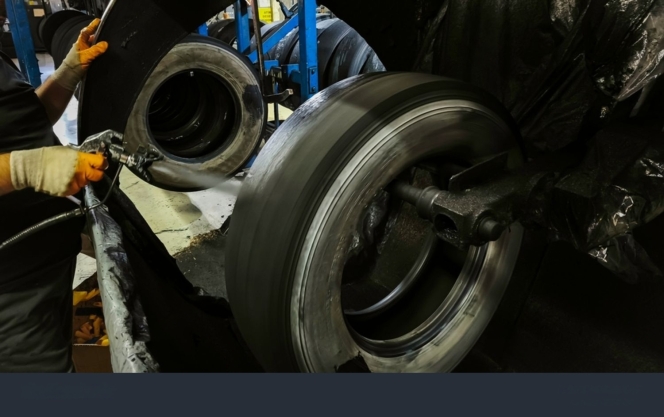
A population of over 1.4 billion people catapulting into the world’s third largest automobile market with four million trucks plying across a road network of 6.3 million kilometres supported by a USD 13.4 billion tyre market and a mining sector contributing around 2–2.5 percent of the country’s GDP demonstrate the strength of India’s automobile, freight and tyre sectors.
The story doesn’t end there as the Central Government adopts a strategic approach on reducing carbon emissions across these verticals, especially automobile and tyres, with targets such as the Net Zero Carbon Emissions by 2070, battery electric vehicles target by 2030, zero-emission truck corridors, Extended Producer Responsibility for the tyre sector; the list just goes on.
Amidst all such statistics and targets, a silent spectator remains the old and varied sector of tyre retreading. In a recent news story reported by Tyre Trends, the Indian Tyre Technical Advisory Committee (ITTAC) had made a proposal to Tyre Retreading Education Association (TREA) for mandating certain standards that will improve the quality of retreads. ITTAC has made recommendations to the BIS committee. TREA is part of the same committee. ITTAC and TREA are recommending different standards.
These standards included BIS retread standards, namely IS 15725, IS 15753, IS 15524 and IS 9168. The ITTAC had partially aligned Indian requirements with ECE R109, the European regulatory benchmark.
In a reply to the proposal, which was accessed by Tyre Trends, TREA urged the Indian Tyre Technical Advisory Committee to seek a deferment or non-applicability of BIS standard IS 15704:2018 for retreaded commercial vehicle tyres, warning that mandatory enforcement could cripple the sector.
In the letter, TREA argued that IS 15704:2018 is largely modelled on new tyre manufacturing norms and is technically unsuitable for retreading, which is a restoration and recycling process.
The standard mandates advanced laboratory tests such as spectrometer-based rubber analysis, endurance testing and compound uniformity checks, requirements that most retreading units, particularly small and medium enterprises, are not equipped to meet
The association highlighted that even large retreaders lack the infrastructure and skilled manpower needed for BIS-grade testing, while the sheer number of retreading units would make inspections and certifications operationally unmanageable for regulators.
TREA warned that compliance costs linked to machinery upgrades, audits and quality control could force 70–80 percent of units to shut down, leading to job losses, higher fleet operating costs and adverse environmental outcomes due to reduced recycling
Instead, TREA proposed that BIS prioritise retreading-specific standards such as IS 13531 and IS 15524, which focus on materials, process control, safety and quality consistency.
The body has also called for a phased transition roadmap, MSME support and industry training before any stricter norms are enforced, stressing that abrupt implementation would undermine the sector’s role in India’s circular economy.
The conundrum
India has a total of 36 administrative divisions comprising 28 states and 8 union territories. The tyre retreading sector has been continuously supporting circularity goals since the early 1970s across the world’s largest economy without getting mainstream recognition.
Even after five decades in service, the industry battles different bottlenecks including fragmentation, manpower shortage, tax pressures brought about by the recent GST revisions and now the implementation of such standards, just to name a few.
The sole practice that can simultaneously reduce carbon emissions from tyres and extend tyre life is assumed the nemesis of an ‘infamous and dangerous practice’ in some states of the country.
However, the industry has been drawing its techniques and quality parameters from the world’s oldest retreading economy, Europe.
“Big retreaders in India already have the necessary processes in place that conform to IS 15524 standards. However, as the standard is not yet mandated, we have voiced support for it because it is process-oriented and outlines how retreading should be carried out, including buffing and building procedures,” said TREA Chairman Karun Sanghi.
He added, “This standard focuses on how the work is done rather than imposing product-level testing that cannot be practically implemented. The current debate on IS 15704 stems from it being fundamentally incompatible. The standard includes requirements such as sidewall marking and destructive testing of retreaded tyres, which are impractical in a retreading environment where each tyre differs in brand, size, application and usage history,” he added.
Destructive testing, he argued, assumes uniform batch sizes. In retreading, where every casing is unique, testing even a single tyre would mean destroying finished products without yielding representative results. Applying such a framework would effectively require the destruction of every tyre in a batch, making compliance unviable.
“We have submitted our response to ITTAC and are awaiting feedback from the committee. We remain open to continued dialogue and will engage further once the committee responds to our submission,” said Sanghi.
According to him, a typical retreader processes about 300 tyres a month across multiple brands including MRF, JK Tyre, Apollo and Michelin and applications ranging from buses and trucks to mining vehicles. These casings vary widely in load cycles, operating conditions and duty patterns, often across several models from the same manufacturer.
The committee has cited European standard ECE R109, but Sanghi points to structural differences: “Europe is a global retreading hub where tyre manufacturers such as Michelin and Bridgestone dominate operations, collect their own tyres, retread them and return them to fleets, making batch-based destructive testing relevant. A similar model exists in US, where large tyre companies lead retreading and largely self-regulate without a single overarching standard. The Indian scenario is different, especially with a fragmented market.”
He stressed that the industry is not opposed to standards but to those that cannot be practically applied, warning that adopting European manufacturing-oriented norms without accounting for India’s market structure and operating realities would be counter-productive.
The debate is no longer about whether standards are needed but whether they are fit for purpose. Without accounting for India’s fragmented retreading ecosystem, enforcing impractical norms could dismantle a circular industry in the name of compliance.
TGL Season 2 Kicks Off With Hankook As Founding And Official Tire Partner
- By TT News
- December 29, 2025
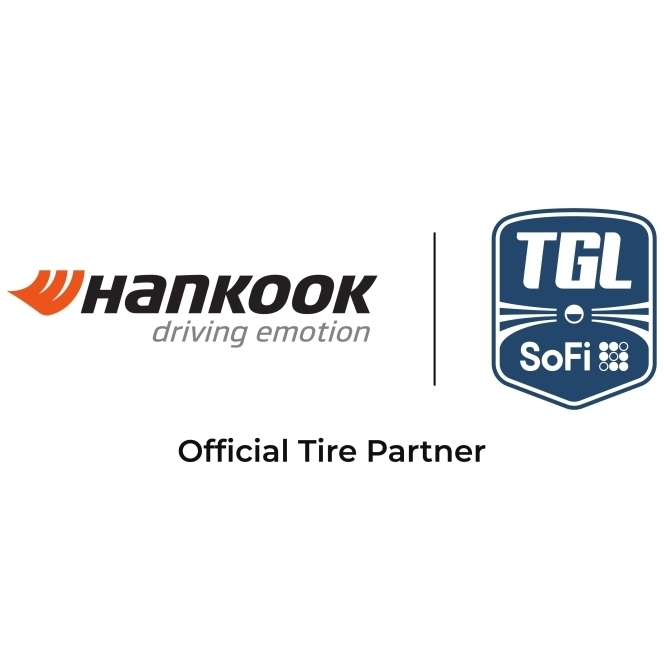
The second season of TGL Presented by SoFi, where Hankook Tire serves as the Founding and Official Tire Partner, commenced on 28 December 2025. This innovative league, a venture of TMRW Sports with backing from icons like Tiger Woods and Rory McIlroy, represents a strategic alignment for Hankook, uniting two entities driven by technological advancement. The partnership provides a global platform to reinforce Hankook's premium brand positioning across North America and worldwide through extensive visibility during broadcasts and at the state-of-the-art SoFi Center in Florida.
This unique venue embodies the league's fusion of sport and technology, featuring a massive simulator with a dedicated ScreenZone and a dynamic GreenZone. This area, equipped with a turntable and over 600 actuators, meticulously replicates real-world golf conditions indoors, creating an immersive arena experience. The competition itself is fast-paced and engaging, with teams of PGA TOUR players competing in Triples and Singles sessions over 15 holes. Innovative elements like the point-doubling ‘Hammer’, real-time strategy via ‘Hot Mic’ and a Shot Clock ensure a dynamic spectacle for fans.
The season opener presented a compelling narrative as a rematch of the inaugural finals, pitting the undefeated Atlanta Drive GC, featuring Justin Thomas and Patrick Cantlay, against a determined New York Golf Club squad led by Matt Fitzpatrick and Xander Schauffele. This match set the tone for an intensive season running through March, where six teams and 24 top golfers will compete. For Hankook, this partnership is more than signage; it is an active engagement with a global community, delivering a distinctive brand experience that bridges cutting-edge mobility and sport for enthusiasts everywhere.
Dunlop Secures CDP ‘A List’ Recognition For Climate Change And Water Security
- By TT News
- December 29, 2025
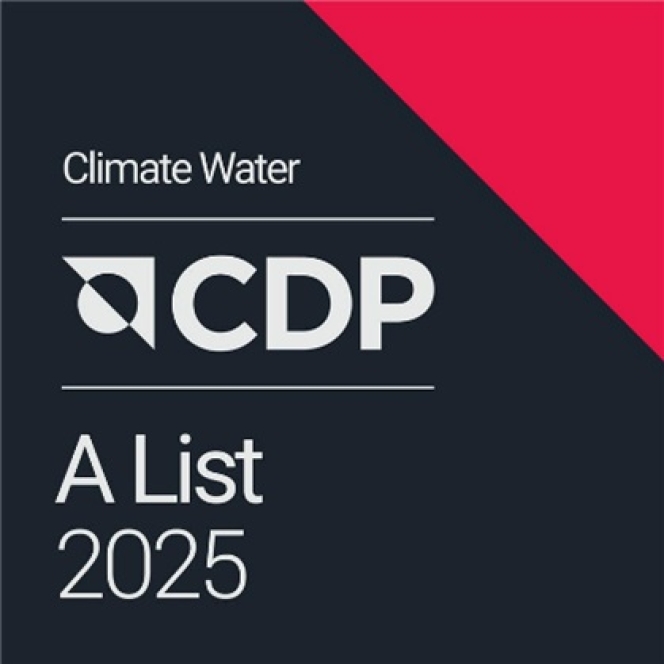
Dunlop (company name: Sumitomo Rubber Industries, Ltd.) has made its way to the annual A-List of CDP for climate change and water security. This premier designation, awarded for the first time to the company in the 2025 evaluation, recognises world-leading performance in transparency, risk management and environmental action. CDP’s annual assessment is a key benchmark for corporate sustainability across climate, water and forests.
This achievement stems from the Group’s integrated approach to material issues outlined in its corporate philosophy. It treats the interconnected challenges of climate change, biodiversity and the circular economy holistically, advancing concrete initiatives under its long-term ‘Driving Our Future’ sustainability policy.
On climate, the Group’s science-based emission reduction targets for 2030 are validated by the Science Based Targets initiative. Operational efforts include pioneering green hydrogen production at its Shirakawa Factory and developing tyres made entirely from sustainable materials by 2050. The company also works to reduce emissions across its supply chain, lowers tyre rolling resistance to improve vehicle fuel economy and extends product life through retreading.
For water security, the strategy is driven by localised risk assessments at global production sites. In seven facilities identified as high-risk, the goal is to achieve 100 percent wastewater recycling by 2050. Progress is already evident, with the company’s Thailand factory reaching full wastewater recycling in 2024.
These coordinated actions on multiple environmental fronts formed the basis for the Group’s simultaneous top-tier recognition in both critical categories from CDP.
Bridgestone Launches Co-Creation Initiative With Ethiopian Airlines Group
- By TT News
- December 29, 2025
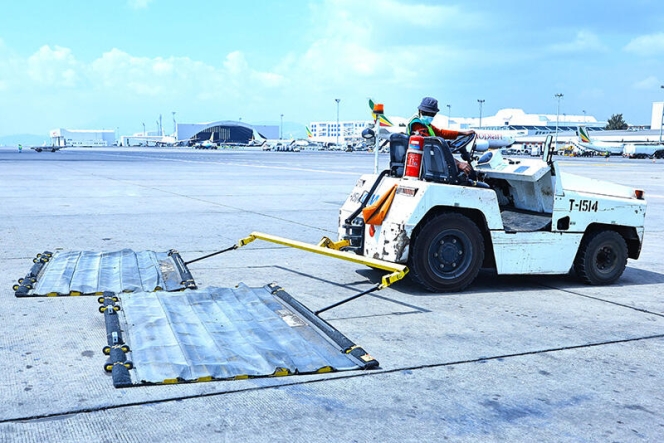
Bridgestone Corporation has initiated a novel co-creation programme in partnership with Ethiopian Airlines and Ethiopian Airports, focused on enhancing aviation safety at Addis Ababa Bole International Airport. This marks Bridgestone’s first sustained three-way collaboration with both an airline and an airport authority, targeting the reduction of Foreign Object Debris on runways and taxiways to support safer and more reliable aircraft operations.
The project was prompted by tyre-related incidents linked to debris at the airport, which previously risked disrupting flight schedules. Leveraging its specialised system for inspecting used airline tyres and analysing debris data, Bridgestone assessed conditions at the hub and proposed a tailored action plan. The company provided continuous support by analysing debris distribution patterns, developing visual hazard maps, advising on efficient collection methods and conducting training to raise awareness among airport personnel.
These sustained efforts have yielded significant results, substantially lowering the rate of tyre damage caused by runway debris compared to levels before the collaboration began. This reduction has supported improved on-time performance for Ethiopian Airlines while advancing overall operational safety. Additionally, the initiative has encouraged greater use of retreaded tyres, promoting economic efficiency and environmental sustainability within the airline’s operations.
Looking ahead, Bridgestone and Ethiopian Airlines Group plan to deepen their co-creation efforts, aiming to generate further value for the aviation sector and broader society through continued innovation and partnership.
Retta Melaku, Chief Operating Officer, Ethiopian Airlines, said, "At Ethiopian Airlines, the safety of our passengers, employees and aircraft is a priority. We are pleased to collaborate with Bridgestone to further strengthen our efforts in reducing FOD at Addis Ababa Bole International Airport and ensure safe operations at the hub airport."
Getaneh Adera, Managing Director, Ethiopian Airports, said, "We remain fully committed to upholding the highest safety standards at Bole International Airport at all times. This significant achievement in reducing FOD is the result of our strong commitment for safe operations and close collaboration with Bridgestone. Through our co-creation activities, we are pleased to have realised safer operations with enhanced productivity and economic value."
Jean-Philippe Minet, Managing Director, Bridgestone Aircraft Tire (Europe) S.A., said, "By combining the learnings and insights from Ethiopian Airlines' operational issues with our analysis technology and know-how, we have deepened our co-creation to propose customised solutions. We are delighted to contribute to safe aircraft operations with peace of mind and to improved operational productivity through the co-creation of efficient FOD reduction on airport surfaces. Through further expansion and evolution of this solution, we will amplify the value of our ‘Dan-Totsu Products’, trust with our customers and value of the data for creating new value."







Comments (0)
ADD COMMENT